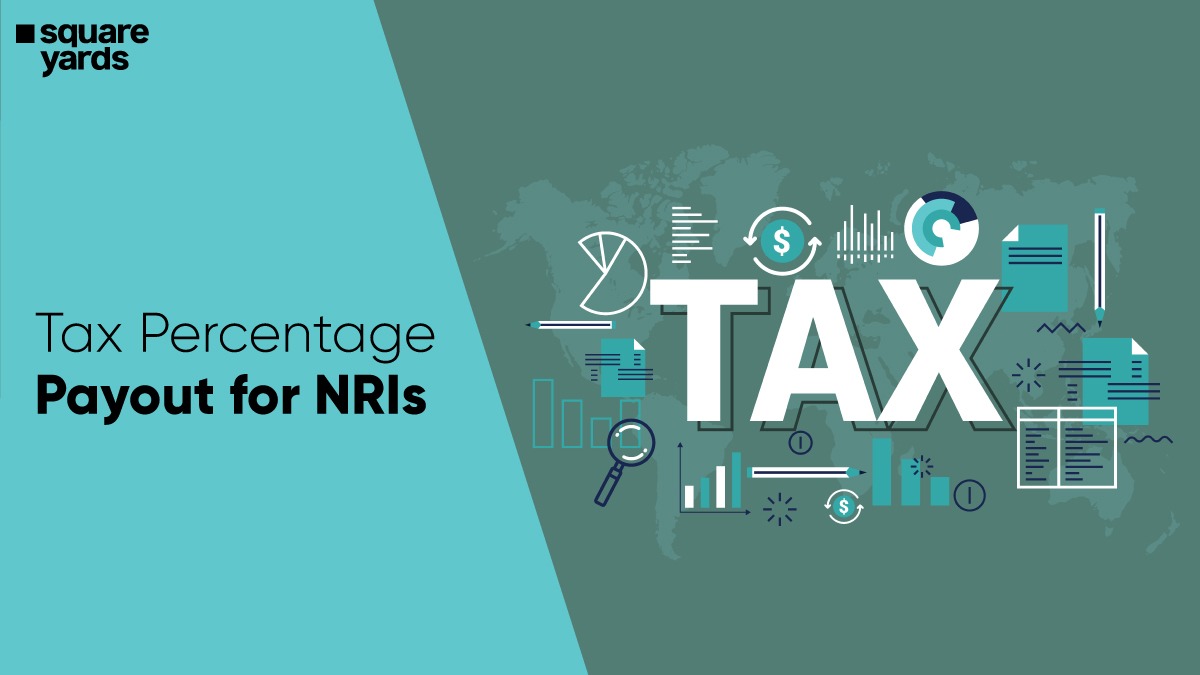
Investing in real estate has always been a popular choice for people looking to diversify their portfolios while securing long-term financial stability. For Non-Resident Indians (NRIs) or NRI in general, the desire to invest in their home country often arises, sparking questions about whether they can buy and sell properties in India. This comprehensive buyer's guide aims to address these queries and provide valuable insights into the legalities, regulations, and processes involved in real estate transactions for NRIs in India. Understanding NRI Status To determine the eligibility of NRIs to buy and sell properties in India, it is crucial to define the term NRI. An NRI is an Indian citizen living outside the country or has gone abroad for professional, education or other purposes and intends to stay there for a long time. Can NRI Sell Property in India? Yes, Non-Resident Indians (NRIs) are permitted to sell properties in India. NRIs can sell residential and commercial properties that they own in India, subject to the necessary legal requirements and regulations. It is also important for the NRIs to comply with the applicable tax laws and regulations related to property transactions in India. They may also need to fulfil any obligations related to capital gains tax and repatriation of funds. Thus, it is highly recommended that NRIs seek professional guidance from legal or financial experts. It will help transpire a smooth property selling process. Buying Property in India as an NRI Types of Properties NRIs can purchase residential and commercial properties in India, subject to certain conditions and restrictions. Agricultural land, farmhouses, and plantation properties, however, generally cannot be acquired by NRIs. Funding the Purchase NRIs can finance property purchases through funds remitted to India through regular banking channels, including NRE (Non-Residential External) or FCNR (Foreign Currency Non-Resident) accounts. They can also avail of home loans from Indian financial institutions, provided they meet the necessary criteria. Documentation and Legal Requirements When it comes to documentation, the NRIs need to have certain documents. These include - A valid passport, PAN (Permanent Account Number) card, OCI (Overseas Citizen of India) card, or PIO (Person of Indian Origin) card Power of Attorney (POA) NRIs usually trust representatives in India through a Power of Attorney to handle property-related matters on their behalf. The legal arrangement allows the representative to sign documents and complete property transactions. Selling Property in India Capital Gains Tax For the unversed, NRIs are subject to capital gains tax that incurs on selling properties in India. Long-term capital gains are taxed at a lower rate than short-term gains. Repatriation of Funds NRIs can also repatriate the funds earned from selling properties in India. These are subject to certain restrictions as well as compliance with FEMA regulations. NRI Legal Considerations Title Verification Before purchasing any property, NRIs must conduct a thorough title verification to ensure the property is free from encumbrances or legal disputes. Engaging the services of a reputable lawyer or a title verification agency is advisable to ensure a smooth and secure transaction. Taxation and Compliance NRIs must comply with Indian tax laws and fulfil their obligations by paying property taxes, stamp duty, and other levies as applicable. It is essential to stay updated on any amendments or changes in tax regulations that may impact property ownership and transactions. Can NRI Sell Agricultural Land in India? No, an NRI cannot sell agricultural land. The buying and selling of agricultural land are only restricted to Indian citizens. NRIs can only sell residential and commercial properties in India as per the given guidelines. Restrictions or Requirements for NRIs to Selling Inherited Property in India? When it comes to an NRI selling inherited property in India, certain restrictions and requirements need to be considered. Here are the key points to keep in mind: NRI Eligibility Criteria As an NRI, you are eligible to sell inherited property in India. The sale can be executed by following the necessary legal procedures and fulfilling the requirements set by the authorities. Documentation It is important that you have all the essential documents related to the inherited property, such as the will, and succession certificate, along with any other legal documents that establish your right to sell the property. Tax Implications Selling an inherited property might attract capital gains. The tax liability depends on multiple factors, including the holding period of the property and the cost of acquisition. Compliance with FEMA Regulations Ensure that you adhere to the Foreign Exchange Management Act (FEMA) guidelines during the property sale process. Familiarise yourself with FEMA's specific requirements, permissions, and restrictions to ensure a compliant transaction. Legal Assistance You can also take the help of a lawyer specialising in property law. They can guide you through legal requirements and ensure a smooth sale process. What documents are required for an NRI to Sell a Property in India? When an NRI decides to sell property in India, certain documents are typically required to facilitate the transaction. Here is a list of common documents that NRI may require: Proof of Identity: Valid passport (with a minimum of six months validity remaining) Overseas Citizen of India (OCI) card or Person of Indian Origin (PIO) card (if applicable) Proof of Residence: Address proof from the country of residence (e.g., utility bills, bank statements, or driving license) Property Documents: Sale deed or conveyance deed Allotment letter or possession letter from the builder/developer Encumbrance certificate (to establish that the property is free from any legal dues or liabilities) Building plan approval and completion certificate Inheritance Documents (if applicable): Will or succession certificate Death certificate of the deceased property owner Legal heir certificate or affidavit establishing the inheritance rights Tax-Related Documents: Permanent Account Number (PAN) card Tax identification number from the country of residence (if applicable) Capital gains tax calculations and payment receipts (if applicable) Power of Attorney (POA): A valid Power of Attorney document is required if the NRI appoints a representative in India to carry out the property sale process on their behalf. It is essential to note that the specific documents required may vary based on the nature of the property, state regulations, and the buyer's requirements. NRIS should consult with legal professionals or real estate experts who can guide them through the specific document requirements and ensure a smooth property sale transaction in India. Wrapping Up NRIs can invest in the Indian real estate market, albeit with certain conditions and regulations. With the right knowledge, proper documentation, and adherence to legal requirements, NRIs can successfully buy and sell properties in India. FAQs NRIs are generally prohibited from buying agricultural land, farmhouses, or plantation properties in India. The acquisition of such properties is restricted to Indian citizens or individuals classified as "Persons of Indian Origin" (PIOs) as defined by the government. Yes, NRIs are eligible to inherit properties in India from a relative, such as a parent or grandparent. In such cases, they can legally hold and sell the inherited property per the authorities' guidelines and regulations. NRIs are not required to be physically present in India for property transactions. They can appoint a trusted representative through a Power of Attorney (POA) to carry out the necessary procedures, including signing documents, attending registration processes, and completing the transaction on their behalf.

Exploring Real Estate Opportunities for NRIs: Eligible and Ineligible Properties As an NRI, it's important to understand the regulations and guidelines surrounding ownership if properties in India to make informed decisions. This guide will provide detailed information to help you navigate the process smoothly. Types of Properties NRIs Can Buy Residential Properties NRIs are permitted to purchase residential property in India without any restrictions. This includes apartments, independent houses, villas, and plots of land for residential purposes. NRIs can purchase properties either for self-use or as an investment. When financing the purchase of residential property, NRIs can avail of home loans from Indian banks. Many banks and financial institutions offer specific loan products tailored for NRIs. The eligibility criteria for NRI home loans may vary, but generally, NRIs must have a minimum income and a stable employment history. The loan amount, tenure, and interest rates are determined based on the NRI's income, creditworthiness, and the property's value. NRIs can freely buy and sell residential properties in India. They can lease or rent out their properties for rental income. Additionally, NRIs can inherit residential properties or receive them as gifts from Indian residents or other NRIs. There is no limitation on the number of residential properties NRIs can own in India. NRIs should consult with legal and financial experts to ensure compliance with the necessary regulations and to understand any tax implications associated with owning residential properties in India. Commercial Properties NRIs are allowed to invest in commercial properties in India. This category includes office spaces, shops, retail outlets, warehouses, industrial units, and any property used for commercial purposes. NRIs can buy, sell, lease, or rent commercial properties without restrictions. Non-Agricultural Land NRIs can purchase non-agricultural land in India. This refers to land that is not used for agricultural purposes. NRIs can buy plots for residential or commercial development in urban and rural areas, subject to compliance with local laws and regulations. Flats and Apartments Flats and apartments in multi-story buildings or gated communities are permissible to buy for NRIs. These properties are common in urban areas and offer shared amenities such as swimming pools, gyms, and security services. Townhouses and Villas NRIs are allowed to purchase independent residential properties, such as villas and townhouses. These properties are typically larger in size, offer more privacy, and often come with gardens or exclusive amenities. Residential Plots NRIs can invest in residential plots of land for the future construction of their houses. These plots are available in various sizes and locations, allowing NRIs to customise their homes according to their preferences. Commercial Spaces NRIs can purchase commercial spaces such as office buildings, retail outlets, shops, or warehouses. These properties can be used for business purposes or leased to generate rental income. Types of Properties NRIs Cannot Buy Agricultural Land NRIs face certain restrictions when it comes to buying agricultural land in India. According to the regulations, NRIs are generally prohibited from purchasing agricultural land, plantation properties, or farmhouses. However, there are some exceptions to this rule: NRIs must understand and comply with the specific requirements and documentation necessary for these exceptions. It's advisable to consult with legal experts to navigate the complexities of acquiring agricultural land through inheritance, gifting, or joint ownership. It's worth mentioning that the restrictions on agricultural land do not apply to non-agricultural land within rural areas. NRIs can freely purchase non-agricultural land in rural areas for residential or commercial purposes, subject to compliance with local laws and regulations. NRIs interested in agricultural investments can explore alternative avenues, such as investing in agricultural bonds, mutual funds, or agricultural-related businesses without directly owning agricultural land. Inherited Land NRIs can inherit agricultural land through inheritance, gift, or a formal will from an Indian resident or another NRI. Gifting: NRIs can receive agricultural land as a gift from an Indian resident or another NRI. Joint Ownership: NRIs can acquire agricultural land by being a joint owner with a close relative who is an Indian resident. Plantation Properties NRIs are restricted from buying plantation properties in India. Plantation properties refer to estates used for cultivating crops like tea, coffee, rubber, palm oil, and other agricultural activities. This restriction aims to safeguard and promote the agricultural sector, ensuring that the ownership of plantation properties remains primarily in the hands of agricultural experts and residents of India. However, NRIs can explore other investment opportunities in the agricultural sector, such as investing in agricultural businesses, companies, or agricultural-related projects, subject to the regulations and guidelines set by the government. It's crucial for NRIs to be aware of these restrictions and to comply with the laws pertaining to the ownership and investment in plantation properties in India. Farmhouses NRIs are generally prohibited from purchasing farmhouses in India, both in urban and rural areas. Farmhouses are considered properties that serve agricultural or farming purposes. The restriction on purchasing farmhouses aligns with the regulations to preserve agricultural resources and prevent non-agricultural entities, including NRIs, from acquiring such properties. However, it's important to note that NRIs can still invest in residential properties resembling farmhouses or offering a rural living experience, as long as they are not designated as farmhouses or used for agricultural activities. Resale of Properties NRIs can freely sell any residential or commercial property in India to another NRI or an Indian resident. There are no restrictions on the resale of properties for NRIs. When selling a property, NRIs must comply with legal requirements and documentation. It's advisable to engage the services of a reputable real estate agent or legal expert to facilitate a smooth transaction and ensure compliance with all legal obligations. The resale market in India offers opportunities for NRIs to liquidate their investments, benefit from capital appreciation, or make strategic property changes as their needs evolve. Financing Property Purchases NRIs can avail home loans from Indian banks to finance their property purchases in India. Several banks and financial institutions offer specific loan products designed for NRIs, commonly called NRI home loans. The eligibility criteria for NRI home loans may vary among banks but generally include the NRI's income, employment stability, creditworthiness, and the property's value. NRIs can apply for home loans to purchase residential or commercial properties. FAQs Yes, NRIs can avail home loans from Indian banks to finance their property purchases in India. Many banks and financial institutions offer specific loan products tailored to NRIs, called NRI home loans. NRIs can apply for home loans to purchase residential or commercial properties, subject to the bank's eligibility criteria and documentation requirements. No, there are no restrictions on the number of residential properties NRIs can own in India. NRIs can purchase multiple residential properties, whether for self-use or as investments. However, it's important to comply with the relevant tax and legal regulations regarding property ownership and rental income if applicable. NRIs can inherit agricultural land in India through inheritance, gift, or will from an Indian resident or another NRI. In such cases, the NRI becomes the legal owner of the inherited agricultural land. However, it's essential to understand and fulfill the specific requirements and documentation for transferring inherited agricultural land to ensure compliance with the regulations.

Challenges Faced by NRIs When Buying Properties in IndiaNon-Resident Indians (NRIs) residing across the globe often consider investing or buying in real estate back home in India. However, this decision comes with its own set of challenges. From understanding the legalities and managing financial transactions to dealing with the ground realities of property management, the process can seem daunting. As a result, many NRIs find themselves unsure about the path to property ownership in India.This thorough guide is designed to support you as an NRI in buying property in India. It aims to eliminate any complexity or challenges of the process while providing a clear and concise understanding of the various aspects you need to consider. With detailed insights into property laws, financial norms, taxation rules, and more, this guide is your roadmap to making a well-informed property investment decision in India.Furthermore, buying property is about more than just following a process. It's about knowing the market, understanding your investment goals, and being aware of the current economic and financial climate. Every element plays a critical role in your property investment decision. Our guide also delves into these aspects to assist and equip you with a holistic understanding of property buying as an NRI.Eligibility for Buying A PropertyUnder the Foreign Exchange Management Act (FEMA), every NRI can buy residential and commercial properties in India. However, it must be noted that there are certain kinds of restrictions on certain properties, including agricultural land, farmhouses, and plantation properties, which NRIs are not permitted to buy. Financial TransactionsPurchasing property requires monetary transactions in Indian Rupees (INR) through Indian banks. Non-Resident Indians (NRIs) can avail of home loans from Indian banks and repay them in INR. It's important to understand the regulations the Reserve Bank of India (RBI) put forth to avoid legal complications. Power of Attorney (POA)NRIs can assign a Power of Attorney (POA) to a trustworthy person in India to handle property transactions on their behalf. It includes property registration, documentation, and, if required, borrowing loans. The POA must be legally valid and executed correctly in the presence of appropriate legal authorities.TaxationUnder the Income Tax Act 1961, profits earned from the property in India, including rent and profit from the sale, are subject to tax. Thus, it becomes important to understand the various tax implications is crucial, and it's advised to consult a tax expert for detailed guidance.Repatriation of FundsThe process that is inclusive of transferring the proceeds from the sale of the property back to your foreign account is known as repatriation. There are specific RBI guidelines regarding the repatriation of funds that need to be adhered to by the NRIs. Property Management Post BuyingFor NRIs, managing a property in India from overseas can be challenging. Hiring a property manager can solve this issue, ensuring everything from tenant search to rent collection and regular maintenance is handled efficiently.Legal Due DiligenceLegal due diligence is extremely important in property transactions. It involves verifying the property title, ensuring the seller has the full right to sell the property, and checking for any pending legal disputes, unpaid dues, or liens on the property. Additionally, the land use permissions should be verified to confirm that the property is not on agricultural or non-residential land.Also, all required approvals and licenses for the property construction should be in place. When buying an under-construction property from a builder, scrutinise their reputation, past projects, and delivery track record.Consider hiring a lawyer to conduct a thorough legal check of the property. It might seem like an additional cost, but it can save you from potential legal disputes and financial loss in the future. Taking shortcuts in legal, due diligence can lead to severe implications, making it a non-negotiable step in the property buying process.Rental Income and Its ImplicationsRenting out the property can be a source of income, but it's also subject to tax in India and potentially in your country of residence. Understanding the tax implications and the Double Taxation Avoidance Agreement (DTAA).Real Estate AgentsNavigating the complexities of the Indian real estate market from afar can be a formidable challenge for NRIs. An experienced agent can provide valuable insights into the market trends, help you find the right property that suits your needs, assist in price negotiation, and guide you through the legal and documentation process.However, it's paramount to verify the credibility of the agent. Conduct thorough research, check for their registration with authorised bodies, ask for references, and assess their understanding of the market and legal procedures. A trustworthy and knowledgeable agent can be your ally in property buying, ensuring you make an informed decision.Investment Perspective Post BuyingProperty investment should never be impulsive, especially when you're an NRI. Clear investment objectives are essential before venturing into the Indian real estate market. Are you looking at property purely as an investment for capital appreciation, or are you planning to earn a regular income through rent? Or are you considering returning to India and wanting your own house?Each of these objectives necessitates different strategies. For instance, if you're seeking rental income, look at properties in well-established areas with good connectivity and amenities. On the other hand, for long-term capital appreciation, you could explore emerging locations with high growth potential.When making investment decisions, remember to factor in currency exchange rates, economic conditions, and property market trends. An investment with a clear perspective can pay off significantly in the long run.FAQsAs an NRI, you can purchase residential and commercial properties in India. However, the FEMA restricts NRIs from purchasing agricultural land, farmhouses, and plantation properties.You can finance your property purchase through funds in your Non-Residential External (NRE), Non-Residential Ordinary (NRO), or Foreign Currency Non-Residential (FCNR) accounts. Additionally, you can avail of home loans from Indian banks. All transactions must be done in INR.Income earned from property in India, including the income from rent and the sale of property, is subject to income tax in India under the Income Tax Act 1961. It's recommended to consult with a tax expert to understand the various tax implications, which can vary based on your specific situation.Yes, you can repatriate the proceeds, but it must be done in accordance with the guidelines set by the RBI. Certain conditions and limits exist to the amount repatriated in a financial year.You can assign a Power of Attorney (POA) to a trusted person in India to handle your property transactions, including property registration, documentation, and even borrowing loans if required. The POA must be legally valid and executed correctly.

Essential Factors for NRI Property Buyers: A Comprehensive Guide Purchasing property as a Non-Resident Indian (NRI) requires careful consideration and thorough research on the magnitude of factors. It is an important decision that involves significant financial investment and long-term implications. If you want to buy a house for yourself or invest in a business property, knowing what things should affect your decision is important. This guide is for individuals who live in a different country from their own and wish to purchase property in their home country. It aims to provide useful information and advice on things to consider when buying property. This guide lets you make wise decisions and better understand how the real estate market functions. Investing in Indian real estate as an NRI offers numerous advantages. It provides a tangible asset that can appreciate in value over time, generate rental income, and serve as a potential source of long-term financial security. However, it is important to approach the process cautiously and conduct comprehensive research to mitigate potential risks and maximise the benefits. Considering all the important factors, NRIs can make informed decisions when buying property in India. It is advisable to seek guidance from lawyers, financial advisors, and property management agencies to navigate the process effectively. Investing in real estate is a long-term commitment, and a well-informed decision can lead to fruitful returns and a secure investment portfolio. Location The property's location is one of the crucial factors in its value and potential returns. As an NRI, it's important to consider the location from various perspectives. Firstly, assess the property's proximity to essential amenities such as schools, hospitals, shopping centres, and transportation links. Properties located in areas with convenient access to these facilities attract higher demand and offer better rental yields. Additionally, consider the location in terms of the neighbourhood and its potential for growth. Look for areas with stable growth potential, upcoming infrastructure projects, and a thriving job market. Such locations tend to experience appreciation in property values over time, providing a solid return on investment. Legal and Regulatory Compliance Ensuring that the property you're interested in is legally compliant and free from any legal disputes is important. As an NRI, familiarising yourself with the local real estate laws and regulations that apply to property transactions is important. Each state in India may have its own laws and regulations regarding property ownership by NRIs. Understanding these regulations and the documentation required will help you navigate the process smoothly. Engaging the services of a reputable lawyer or legal expert specialising in NRI property transactions is highly recommended. They can guide you through the legal process, verify the property's compliance, and ensure a smooth and secure transaction. Developer's Reputation Researching the reputation and track record of the property developer is essential before making a purchase. Look for developers with a history of delivering projects on time, good construction quality, and adherence to regulations. You can start by checking the developer's website, online reviews, and testimonials. It's also beneficial to visit their previous projects or speak with existing customers to gain insights into the developer's reliability and the overall quality of their work. A reputable developer instils confidence in your investment and ensures a higher likelihood of timely project completion and overall satisfaction. Financial Considerations When buying property as an NRI, it's important to consider your budget and explore various financing options. Start by assessing your financial capacity and determining the amount you can comfortably invest. Consider factors such as your savings, availability of funds for down payment, and eligibility for home loans. NRIs are eligible for home loans from Indian banks, but the eligibility criteria may vary. Factors such as income, employment, credit history, and the property's location can influence your eligibility for a loan. Compare interest rates different banks and financial institutions offer, considering the associated processing fees and hidden charges. Calculate the overall cost of the property, including taxes, registration fees, maintenance charges, and any other additional expenses. It's advisable to consult a financial advisor specialising in NRI investments to help you make an informed financial decision. Property Inspection and Documentation A thorough property inspection ensures its condition, structural integrity, and quality. If you cannot visit the property physically, consider engaging the services of a professional property inspector to assess the property on your behalf. They can provide detailed reports on the property's condition, identifying potential issues or areas requiring attention. In addition to the inspection, verify all the necessary documents related to the property. It includes title deeds, ownership records, building approvals, occupancy certificates, and other relevant documents. Working with a reliable real estate agent or legal expert can help ensure all the documentation is in order, reducing the risk of legal complications in the future. Conclusion Investing in real estate as an NRI can be a rewarding and lucrative venture if approached with careful consideration and thorough research. By understanding the legal framework, conducting due diligence, selecting the right location and developer, and addressing financial and management aspects, NRI property buyers can minimise risks and maximise their returns. Remember, it is always advisable to seek professional guidance. FAQs NRIs can generally purchase residential and commercial properties in India, except for agricultural land, plantation, or farmhouse property. However, it's important to note that certain states may have specific regulations and restrictions on property ownership by NRIs. Therefore, you must check the rules of the particular state where you intend to buy. Yes, NRIs can avail of home loans from Indian banks to buy property in India. Banks have specific loan schemes for NRIs, but the eligibility criteria may vary. Income, employment, credit history, and the property's location can influence loan eligibility. It's advisable to approach multiple banks and compare their loan offers to choose the one that best suits your needs. Managing property maintenance and rental income from abroad can be challenging for NRIs. To address this, NRIs can appoint a trusted property management agency to handle these aspects. Property management agencies can take care of property maintenance, rent collection, tenant management, and other administrative tasks on behalf of the property owner. These agencies ensure the property is well-maintained, rental income is collected promptly, and tenant-related issues are effectively managed in the owner's absence. Yes, NRIs are liable to pay taxes on property transactions in India. The tax implications may vary based on the property type, holding period, and the nature of the transaction (buying, selling, or renting). Taxes applicable to NRIs include stamp duty, registration fees, and capital gains tax. It's advisable to consult a tax advisor or chartered accountant specialising in NRI taxation to understand the specific tax obligations and plan your investments accordingly. Yes, NRIs are generally allowed to repatriate the sale proceeds from property in India, subject to certain conditions and limits. The Reserve Bank of India (RBI) sets guidelines and regulations regarding the repatriation of funds. NRIs can repatriate up to two residential properties' sale proceeds, subject to the satisfaction of specific conditions. It's important to comply with these guidelines to ensure a smooth and legal transfer of funds. Seeking assistance from a professional financial advisor or bank can help you navigate the repatriation process effectively.

Maximising Returns: The Advantages of Property Investment in India for NRIs Investing in real estate can be lucrative, especially for NRIs looking to establish roots or diversify their investment portfolio in India. With a growing economy and numerous favourable factors, buying property in India can offer profitable returns. This NRI guide aims to provide comprehensive information to NRIs considering investing in real estate in India. Factors Leading to Buying Properties in India With its rich cultural heritage and rapidly developing economy, India has become an appealing profitable destination for NRIs. The Indian real estate market has witnessed significant growth in recent years, driven by urbanisation, infrastructure development, and favourable government policies. These factors have contributed to the rise in property values across major cities, making it an opportune time for NRIs to explore the market. Economic Growth The country's consistent economic growth is a primary factor that makes buying property in India profitable for NRIs. This growth creates a positive environment for property appreciation and rental income potential in numerous metropolitan cities such as Delhi, Mumbai, and Bangalore. Demographic Another factor is the demographic dividend of India. With a young and expanding population, there is a high demand for housing, particularly in urban areas. The increasing urbanisation and rising disposable incomes have further fueled the demand for residential and commercial properties. This demand-supply gap creates opportunities for NRIs to invest in properties that cater to the population's evolving needs. Infrastructure Moreover, India's focus on infrastructure development has significantly impacted property values. Investments in transportation networks, such as metro rail projects, highways, and airports, have enhanced connectivity, accessibility and profitable ventures. These infrastructure developments increase the convenience and livability of cities and positively influence property prices. Profitable Government Schemes The Indian government's initiatives and policies have further strengthened the real estate sector, making it more attractive for NRIs. Schemes like "Housing for All" aim to provide affordable housing options, while relaxed regulations for NRIs encourage foreign investments in the real estate market. These favourable policies create a conducive environment for NRIs to invest in India. Rental Yields Certain cities in India offer attractive rental yields, making them ideal for NRIs seeking rental income. Research the rental market in your chosen location to assess the potential returns on your investment. In the following sections of this guide, we will delve deeper into the legal and regulatory aspects, financing options, and risk mitigation strategies for NRIs interested in buying property in India. By understanding the market dynamics comprehensively and making informed decisions, NRIs can make profitable investments in Indian real estate. Understanding the Indian Real Estate Market : Is it Profitable enough? The Indian real estate market is a dynamic and evolving sector that offers numerous opportunities for NRIs. Understanding the market trends and dynamics is crucial for making profitable investment decisions. Here are some key aspects to consider: Market Research Conduct thorough research on the Indian real estate market to identify the best locations and property types. Analyse market trends, growth patterns, and future prospects to make informed investment choices. Every city has a different market pattern depending on its niche. Close down on your preference and city and examine the market accordingly. Emerging profitable Trends Stay updated on the emerging trends in the real estate sector. For example, the demand for affordable housing, co-working spaces, and sustainable development is rising. Identifying these trends can help you target the right property segments for higher profitability. Property Types Indian real estate offers a variety of options, including apartments, villas, plots, and commercial properties. Before deciding, evaluate the demand-supply dynamics and the potential for capital appreciation and rental income in each property type. Some of these are highly profitable as compare to the latter. City Selection India has several metropolitan and emerging Tier 2 cities with investment opportunities. Consider factors such as infrastructure development, economic growth, employment opportunities, and connectivity while selecting a city for investment. Bangalore is the Tech City, whereas Mumbai is the commerce hub. Every metropolitan city has its own unique qualities, along with its pros and cons. Developer Reputation Research the reputation and track record of developers before investing. Choose established and reputable developers known for delivering quality projects within the stipulated time frame. Legal and Regulatory Aspects Eligibility NRIs can buy residential and commercial properties in India, subject to certain conditions. However, individuals holding citizenship in Pakistan, Bangladesh, Sri Lanka, Afghanistan, China, Iran, Nepal, or Bhutan require prior permission from the Reserve Bank of India to invest in Indian real estate. Property Types NRIs can invest in several commercial and residential properties that offer high-end ROI. These include - Property Types NRI can Purchase and Sell Residential Properties Commercial Properties Apartments Office Spaces Villas Retail stores Townhouses Warehouses Plots Shops Industrial units Property Types NRI cannot Purchase Agricultural Land Plantation Properties Farmhouses Inherited Land Documentation When buying property in India, NRIs need to fulfil specific documentation requirements. This includes - A valid Overseas Citizen of India (OCI) card, Submitting Know Your Customer (KYC) documents, and Adhering to the Foreign Exchange Management Act (FEMA) guidelines. Taxation : Accessing profitable behaviour Understand the tax implications of investing in Indian real estate. NRIs are subject to income tax on rental income earned in India and may have to pay capital gains tax when selling the property. Familiarise yourself with the Double Taxation Avoidance Agreements (DTAA) between India and your country of residence to mitigate any tax-related issues. FAQs NRIs are eligible to inherit property in India from their parents or other family members, subject to applicable laws and taxation. Yes, several banks and financial institutions offer home loans to NRIs. The eligibility criteria and documentation requirements may vary, so it's advisable to research and compare different lenders. NRIs can sell property in India without any restrictions. However, the repatriation of funds depends on the property type and the mode. NRIs and PIOs can access home loans in India, subject to varying eligibility criteria. Requirements include being an NRI/PIO with a regular income source, aged 21 to 60-65 at loan maturity. Loan amounts are based on property value, with limits set by lenders. Credit history, employment stability, and repayment capacity are also considered. NRIs can repatriate funds from property sales in India with certain conditions. For residential properties held for at least three years, NRIs can repatriate up to two properties, limited to the original investment amount made through inward remittances or NRE account funds. For commercial properties, sale proceeds can be repatriated after deducting taxes and providing appropriate documentation. Repatriation limits and procedures should be verified with authorised dealers or banks.

Which Documents Would You Need As An NRI? If you are a Non-Resident Indian (NRI) considering purchasing property in India, it is crucial to know which documents you will need. Buying property involves a range of legal procedures and paperwork; having the necessary documents facilitates a smooth and transparent transaction. This guide aims to provide an overview of the recommended document layout for NRIs purchasing property in India. By familiarising yourself with these essential documents, you can navigate the intricacies of the real estate market with confidence and ensure a hassle-free property purchase in India. Suggested Document Layout for NRI Planning to Buy Real Estate in India Here’s a list of documents that NRIs need before investing in the Indian real estate market: Proof of Identity Valid passport (with visa) Overseas Citizen of India (OCI) card Person of Indian Origin (PIO) card, if applicable For Non-Resident Indians (NRIs) wishing to purchase property in India, it is necessary to present their Indian passport as a proof of identity. However, if you possess a foreign passport, you are eligible to buy property in India as long as you possess either an OCI (Overseas Citizen of India) card or a PIO (Persons of Indian Origin) card. NOTE: PAN card is needed for property transactions. Proof of Address Address proof from the home country (utility bills, bank statements, etc.) Indian address proof (if available) Power of Attorney (PoA) In situations where Non-Resident Indians (NRIs) are unable to be physically present in India to purchase property, it is essential for them to show a power of attorney document. However, it's important to emphasise that a specific power of attorney, which is both registered and notarized, is required rather than a general power of attorney. This grants authority to a trusted representative in India to act on behalf of the NRI buyer. Essential Documents for NRI to Obtain a Home Loan The following documents are required by NRIs to apply for a home loan: Copy of Indian Passport and Visa If NRIs don’t have an Indian passport, they must have- PIO card (If holding a foreign passport) OCI card (If parents are Indian citizens) Latest Salary Certificate / Payslips of the past six months Work Permit/ Appointment Letter/ Employment Contract from the country of residence Latest Income Tax Returns Bureau Report from the country of residence Bank Statements of NRE and NRO Accounts for the last year Power of Attorney in the bank's specified format (if not present in India for property transaction execution) Being NRI : What Documents Pertaining to the Property Should You Request? To ensure a seamless transaction and a trouble-free ownership experience, it is crucial to request and verify the following important property documents: Title Deed (in the seller's name) It is essential to confirm that the property's title deed is in the name of the seller. Certain states may require additional documentation, such as the e-Khata for property taxes, if purchasing property in Bengaluru. Approved Plan Ensure that the property has an approved plan from the relevant authorities. Building Permit Verify that the property's construction has the necessary building permit. Occupancy Certificate (if applicable) In the case of a ready building, obtain the Occupancy Certificate to confirm that it meets the necessary standards for occupancy. Previous Title Deeds (if available) It can be beneficial to review any earlier title deeds associated with the real estate. Updated Encumbrance Certificate Obtain an up-to-date Encumbrance Certificate to check for any existing legal or financial liabilities on the property. Share Certificate (for Cooperative Housing Societies) If the property is part of a cooperative housing society, request the Share Certificate. NOC from the Society Obtain a No Objection Certificate (NOC) from the society, if applicable. RERA Registration (if applicable) In jurisdictions where the Real Estate Regulatory Authority (RERA) is applicable, ensure that the property has the necessary registration. Once these documents are verified and found to be in order, you can proceed further with the preparation of a sale agreement for a property purchase. Basic Documents for NRI Registration Process In addition to your identification proof documents, such as your passport and PAN card, you will be required to provide address proof documents, such as utility bills, along with passport-sized photographs, for the registration of the sale deed. Why is Proper Document Layout Necessary? Buying a home is a big decision, particularly for Non-Resident Indians (NRIs) who want to invest in real estate in India. But navigating the associated legal and administrative procedures can be challenging and intimidating, especially when it comes to documentation. To ensure a seamless and transparent property transaction for NRIs, it is essential to ensure adequate document arrangement. NRIs can protect their rights and accelerate the entire purchasing process by methodically organising and preserving the required papers. Below-mentioned are the reasons why maintaining a proper layout of documents is crucial for NRIs who are planning to purchase property in India: NRI Legal Compliance Proper documentation guarantees adherence to applicable laws and rules governing real estate transactions in India, protecting the buyer's rights and interests. Transaction Transparency A well-organised document layout promotes transparency in the buying process, reducing the risk of fraudulent activities and disputes. Financing and NRI Loan Procedures Since banks and other financial organisations demand thorough verification of income, assets, and property information, correct documentation is essential. Record Keeping Maintaining an organised document structure makes it possible to preserve accurate records, make information retrieval simple in the future, and facilitate any required legal or financial actions. Smooth Transaction Process A well-structured document layout streamlines the purchasing process, cutting down on delays and guaranteeing a more pleasant experience for the NRI buyer. Power of Attorney Requirements Proper document layout is essential if an NRI buyer cannot be physically present during the property purchase. A suitable document layout guarantees the appointment of a dependable agent to act on the buyer's behalf. Frequently Asked Questions (FAQs) For real estate transactions, NRIs should prepare their Indian passport, PIO or OCI card, and registered and notarized powers of attorney. No, NRIs must ensure they have a specific power of attorney that is registered and notarized for executing property transactions in India. NRIs with a foreign passport need to possess either a PIO (Persons of Indian Origin) card or an OCI (Overseas Citizen of India) card along with their passport. No, NRIs can even appoint a trusted individual as their attorney through a registered and notarized power of attorney if they are unable to be physically present in India. It’s advisable for NRIs to consult with legal professionals or real estate experts for specific guidance on any additional documents that may be required based on the location and circumstances of the property transaction.

Guidance for NRI Property Buyers in India Purchasing property in India can be a significant financial decision for Non-Resident Indians (NRIs). While investing in real estate in one's home country can be appealing, it is crucial for NRIs to seek proper guidance and advice throughout the property buying process in India. The complex nature of the Indian real estate market, legal considerations, and potential challenges make it essential for NRIs to have expert assistance to ensure a smooth and successful property purchase. This detailed guide will outline the key reasons why NRIs should seek guidance while buying properties in India. Also, don’t forget to know the source from which this guidance can be taken. Why Should NRIs Seek Guidance While Investing in the Indian Realty Market? Listed below are the top four reasons why seeking guidance is important for NRIs while buying property in India: Understanding the Indian Real Estate Market Gaining an understanding of the Indian real estate market is essential due to its vastness and diversity, with different trends and regulations varying across states and cities. NRIs may lack current knowledge about local market conditions, property values, and emerging investment opportunities. Avoiding Fraud and Mitigating Risks Mitigating risks and avoiding fraud is a significant concern in any real estate market, particularly for NRIs who may be physically absent and have limited local connections. Engaging with trustworthy real estate consultants or property advisors can aid NRIs in mitigating these risks. These professionals can conduct thorough due diligence on properties, verify ownership documents, and ensure a clear title. Seeking guidance allows NRIs to protect their investments and steer clear of fraudulent practices. Navigating Legal and Regulatory Framework Navigating the legal and regulatory frameworks is a crucial aspect of buying property in India. NRIs need to comply with specific procedures guided by the Foreign Exchange Management Act (FEMA) guidelines, Reserve Bank of India (RBI) regulations, and other legal requirements. These complex frameworks can be overwhelming, emphasising the importance of seeking assistance from professionals knowledgeable about Indian property laws. Maximising ROI To maximise Return on Investment (ROI), NRIs need to make well-informed investment decisions. Professionals can also provide insights into factors affecting property values, such as infrastructure development, upcoming projects, and demand-supply dynamics. Where to Seek Guidance From? When Non-Residential Indians (NRIs) are considering purchasing properties in India, it is crucial for them to seek guidance from various sources to ensure a smooth and secure transaction. Here are some key resources and authorities that NRIs can rely on for guidance: Real Estate Agents and Developers Collaborating with reputable real estate agents and developers can provide NRIs with valuable insights into the Indian property market. These professionals can assist in identifying suitable properties, negotiating deals, and handling legal and documentation procedures. Ministry of External Affairs (MEA) The MEA, specifically through its Overseas Indian Affairs division, provides assistance and guidance to NRIs on various matters, including property-related issues. NRIs can contact their local Indian embassy or consulate for information and support. Guidance from Legal Professionals Consulting with legal professionals specialising in real estate and property laws in India is essential. They can guide NRIs through the legalities involved in property transactions, including verifying property titles, conducting due diligence, and ensuring compliance with regulations. Reserve Bank of India (RBI) NRIs must adhere to the regulations set by the RBI for property transactions in India. The RBI periodically updates guidelines regarding property purchases by NRIs, covering financing options, repatriation of funds, and other related aspects. Checking the RBI's website or contacting their designated branches can provide NRIs with the necessary information. Property Portals and Online Forums Numerous property portals and online forums cater specifically to the needs of NRIs. These platforms offer information on property listings, legal requirements, market trends, and user reviews, serving as a comprehensive resource for NRI property buyers. Guidance from Chartered Accountants Engaging the services of qualified chartered accountants is advisable, as they can help NRIs understand the tax implications associated with property transactions in India. They can provide guidance on tax planning, filing returns, and ensuring compliance with Indian tax laws. State and Local Authorities NRIs should also reach out to relevant state and local authorities, such as the local municipal corporation or development authority, to gather information about property regulations, permissions, and any specific requirements related to the location of the property. Important Guidance Considerations When purchasing property in India, Non-Residential Indians (NRIs) should consider the following points to ensure a successful and secure transaction: Do thorough research on the property market, local regulations, and trends in the desired location. Verify property ownership, land titles, any legal issues, and encumbrances associated with the property. Plan your finances properly by setting a budget and considering all costs, including fees, taxes, and charges. Understand and comply with the legal requirements and regulations governing property transactions for NRIs. Ensure all necessary documents, contracts, and agreements are in order and reviewed carefully. Hire a reputable lawyer or property consultant to verify the property's authenticity and condition. Research the reputation and track record of the developer or seller to ensure reliability. Consider engaging a property management company if you plan to rent out the property. Assess future development prospects, infrastructure plans, and the location's potential for appreciation. Frequently Asked Questions (FAQs) Ans: NRIs require guidance when buying property in India due to unfamiliarity with local laws, regulations, and market dynamics. Guidance helps them navigate the process efficiently and make informed decisions. Ans: Real estate agents can assist NRIs by providing market insights, property options, negotiation support, and handling legal and documentation aspects. They act as intermediaries, streamlining the buying process for NRIs. Ans: Yes, NRIs need to be aware of legal considerations such as eligibility criteria, restrictions on certain property types, repatriation rules, tax implications, and compliance with the Foreign Exchange Management Act (FEMA). Seeking guidance helps NRIs navigate these legal complexities.

Whether you're buying a residential property for your family's future, investing in a commercial space, or simply looking to diversify your investment portfolio, register your property is an essential legal requirement for Non-Resident Indians (NRIs). As an NRI, you may have successfully acquired your dream property, ensuring that all the necessary documents are in order. However, navigating the property registration process can sometimes be daunting, especially if you're not familiar with the legal procedures and requirements in India. Essence of Property Register Act 1908 The Registration Act of 1908 was established with a specific constitutional purpose regarding property registration. This Act was enacted to bring order, discipline, and public notice to property transactions while also safeguarding against the falsification of transfer documents. As a result, a registered document holds the utmost credibility and can serve as concrete evidence in a court of law. Register Property Process To register their property in India, NRIs (Non-Resident Indians) can follow the steps below when all their documents are in order: Step 1: Obtain the Necessary Documents Ensure you have all the required documents for property registration. This typically includes the sale deed, previous deeds establishing the chain of ownership, an encumbrance certificate, tax receipts, and identity/address proof. Step 2: Power of Attorney (PoA) If you're unable to be physically present in India for the registration process, you can appoint a trusted representative through a Power of Attorney. This authorised person can act on your behalf during the registration process. Step 3: Visit the Sub-Registrar's Office The property registration process takes place at the Sub-Registrar's Office in the jurisdiction where the property is located. Visit the office with all the required documents, including originals and copies. Step 4: Pay Stamp Duty and Registration Fees Calculate the stamp duty and registration fees applicable to your property based on its value and location. Pay these fees at the designated bank counter within the Sub-Registrar's Office and obtain the challan or receipt as proof of payment. Step 5: Document Verification The Sub-Registrar's Office will scrutinise your documents to ensure they are in order. They will verify the identities of the parties involved, check for any encumbrances or pending litigation on the property, and validate the property's ownership chain. Step 6: Execution of the Sale Deed Once the documents are verified, both parties (buyer and seller) will sign the sale deed in the presence of two witnesses. If you've appointed a Power of Attorney, your representative can sign on your behalf. Step 7: Biometric Verification In some cases, the Sub-Registrar's Office may require biometric verification of the parties involved in the registration process. This is typically done through thumb impressions or other biometric measures. Step 8: Registration and Obtaining Documents After the execution of the sale deed, the Sub-Registrar will register the property in your name. The registration process involves entering the details into the official records. Once registered, you can collect the registered documents, including the sale deed and registration certificate. Step 9: Mutation and Updating Records to Register After registration, it is important to update the property records to reflect the new ownership. This process, known as mutation, is typically done at the local municipal office or revenue department. It ensures that the new owner's name is reflected in property tax records. Is Property Registration Mandatory for NRIs? Yes, property registration is generally mandatory for NRIs (Non-Resident Indians) when they purchase or own property in India. The registration process ensures legal recognition of and ownership rights over the property. It also helps safeguard the interests of the property owner and provides a valid proof of ownership. However, specific requirements and procedures may vary depending on the laws of the respective state or union territory in India. Time Limit to Register Your Property According to the regulations, it's necessary to register a mandatory document within four months from the date of its execution. If this timeframe is not adhered to, the document can still be registered within the following four months, but a penalty of up to ten times the registration fees will be imposed. Alternatively, even after eight months from the execution of the document, parties can choose to register it by attaching a deed of confirmation along with the payment of stamp duty based on the current market value. However, if this timeframe has lapsed, it is recommended to create a fresh document to replace the expired one. The expired documents need to go through a process of adjudication by the collector and then be registered by the Joint Sub-Registrar, which can be a time-consuming procedure. Property Register Fees As per the relevant sections of the Act, the purchaser of immovable property is obligated to pay registration fees to the government. The specific charges for registration vary in each state, as outlined in the Act or the respective State Registration Act. These charges are calculated as a percentage of the property's saleable value. It is crucial to mention that both the stamp duty and the registration fee are determined based on the ‘guidance value’. The guidance value is determined by the state government and is influenced by the property's location. Consequences of Non-Register Properties by NRIs Failing to comply with the registration of documents for the purchase of immovable property, which is compulsory under the Registration Act of 1908, can result in legal consequences, including: The document will not be recognised as legally binding, and any attempts to transfer the property based on that document may be deemed invalid. Without proper registration, the document will not hold weight as admissible evidence in a court of law, potentially hindering any legal actions involving the property. Creating an opportunity for fraudulent activities and misrepresentation. Non-registration leaves room for dishonest practises, as there is no official record available to verify the authenticity and ownership of the property. Frequently Asked Questions (FAQs) Property registration is the legal process of recording ownership rights. It is crucial for NRIs as it establishes ownership, provides legal recognition, and serves as proof of ownership, safeguarding their interests and preventing disputes. Essential documents include the sale deed, title documents, encumbrance certificate, identification proofs, and a power of attorney if applicable. Consequences include lack of legal recognition, inability to provide proof of ownership, increased fraud risk, limited access to benefits or services, and difficulty enforcing property rights in court.

Investing in the Indian real estate market can be an exciting opportunity for Non-Residential Indians (NRIs) looking to diversify their investment portfolio and capitalise on the country's growing property market. However, one of the key considerations for NRIs is to explore unique fund options to buy that property. This guide aims to provide a detailed overview of the various funding options available exclusively for NRIs planning to invest in Indian real estate. Popular Fund Options Available for NRIs As an NRI planning to invest in the Indian real estate market, there are several unique ways to fund your investment. Here are some options you can consider: NRI Home Loans Many Indian banks offer home loans specifically designed for NRIs. These loans allow you to fund a portion of the property's cost, and the remaining amount can be covered through your personal savings or other sources. Pros Accessible financing optionProvides flexibility in repayment optionsOffers competitive interest ratesSimplified application process Cons Limited loan-to-value ratioRepayment process may involve complexitiesLoan approval and disbursement process may take longer External Commercial Borrowings (ECBs) NRIs can also explore the option of raising funds through ECBs. This involves borrowing money from foreign lenders, which can be used for real estate investments in India. However, it's important to consider the terms and conditions of the loan and any associated risks. Pros Competitive interest ratesDiverse lender optionsLarger loan amounts Cons Exchange rate risksRegulatory restrictionsExtensive documentation and approval process Non-Residential External and Non-Residential Ordinary Accounts NRIs can use their NRE or NRO accounts to fund their real estate investments. These accounts allow you to transfer funds from overseas to India and can be used for purchasing properties. You can consult with your bank to understand the specific requirements and procedures involved. Pros A convenient way to manage finances in IndiaEasy Repatriation of fundsTax Benefits Cons Limited Source of FundsFluctuations in exchange ratesAssociated transaction costs Joint Venture (JV) Partnerships Joint Venture (JV) Partnerships pool resources and share the investment costs, making it an attractive option for NRI investors. Pros Access to local expertiseShared financial burdenMitigated legal and regulatory challengesPotential for higher returns Cons Loss of full controlPotential conflicts of interestDependent on partner's performance Non-Convertible Debentures (NCDs) NCDs are debt instruments issued by Indian companies to raise capital. NRIs can consider investing in NCDs offered by reputed real estate developers in India. These investments offer fixed returns over a specified period and can be a source of funding for your real estate ventures. Pros Offer a predetermined interest rateAllows NRIs to diversify their investment portfolio beyond real estateNCDs are regulated by regulatory authorities, ensuring transparencyProvide higher returns compared to traditional fixed deposit schemes Cons Market RiskNCDs are typically unsecuredNRIs need to be aware of the tax implications associated with NCDs Private Financing : Fund Feasibility You may also explore private financing options where you can secure funding from private individuals or investment groups. This could involve negotiating terms and interest rates directly with the lenders. Pros Flexible termsFaster approval processLess stringent criteriaCustomised solutions Cons Higher interest ratesLimited consumer protectionShorter loan tenure It's crucial to note that while these unique funding options present attractive opportunities, they require careful consideration and consultation with financial advisors, legal professionals, and real estate experts. Each funding avenue has its own set of regulations, tax implications, and eligibility criteria that need to be understood and evaluated before proceeding. Key Considerations While Deciding Fund Currency Risks: Be aware of the potential impact of currency exchange rate fluctuations on your investment and implement strategies to manage these risks effectively. Know the Rules: Understand the legal and regulatory requirements for NRIs investing in Indian real estate, keeping up with guidelines from the Reserve Bank of India and other relevant authorities. Choose the Right Funding Option: Research and compare different funding options that offer finance for NRIs. Consider their reputation, track record, interest rates, fees, and customer service before making a decision. Conduct thorough Due Diligence: Research the property you plan to invest in, considering factors like location, market trends, infrastructure development, legal ownership, and potential disputes. Engage experts to conduct due diligence and verify compliance with regulations. Understand Tax Implications: Familiarise yourself with the tax implications in both India and your country of residence, including taxes on rental income, capital gains, repatriation of funds, and any relevant double taxation agreements. Seek professional advice for optimal tax planning. Plan for Repatriation of Funds: If you intend to repatriate funds in the future, understand the RBI guidelines and the necessary documentation for smooth repatriation. Ensure your chosen funding option allows for easy transfer of funds without legal restrictions or delays. Stay Informed and Connected: Keep up to date with market trends, regulatory changes, and investment opportunities through reliable sources. Engage with NRI forums, attend seminars, and connect with other NRI investors to share knowledge and experiences. Frequently Asked Questions (FAQs) Ans: NRIs have unique funding options like NRI Home Loans, NRE/NRO accounts and ECBs for investing in Indian real estate. Ans: The NRE account allows NRIs to hold and manage foreign income in Indian rupees for investing in real estate, with repatriation flexibility. Ans: Yes, NRIs should be aware of RBI regulations on investment limits, fund repatriation, and property types to ensure compliance.

After the introduction of the Goods and Services Tax (GST), the taxation dynamics related to property purchases have undergone significant changes. The implementation of GST for all under-construction properties nationwide has resulted in the replacement of various indirect taxes, such as VAT, Service Tax, and others, with a single, unified tax system. While registration and stamp duty remain familiar taxes, there are additional components to consider. The Income Tax Act of 1961 establishes distinct tax regulations for Indian residents and NRIs. The Act defines the criteria for determining residents and NRIs for taxation purposes, considering the duration of their stay in India. Rules and Regulations Concerning Tax There are two primary laws that govern and outline the regulations for Non-Resident Indians (NRIs) in India: Income Tax Act - Regulates the taxation responsibilities of NRIs. Foreign Exchange and Management Act (FEMA) - Oversees all transactions, investments, the opening of bank accounts, and other related matters involving NRIs. What is the Meaning of 'Accrues in India'? This is explained in Section 9 of the Income Tax Act (it is important to note that this provision applies to all individuals, regardless of their residential status, when determining the income that accrues to them). Aspects Result Income originating from a business connection in India. Income derived from any property, asset, or income source in India. If your response to any of the following is YES, the law considers these incomes to have accrued in India. Capital gains resulting from the transfer of a capital asset located in India. Income obtained from employment services rendered within India. Income received as salary from the Government of India for services provided outside of India, while being an Indian citizen. Dividends paid by an Indian company, regardless of the location of payment. Interest, royalty, or technical fees received from the Central or State Government, or from specified entities under certain circumstances. Sale of Property: TDS and Property Tax Paid by NRI Property tax is an annual recurring fee that is paid by property owners, regardless of whether they are Indian citizens or NRIs. A one-time tax is also applicable during the property purchase, which is paid through Tax Deducted at Source (TDS). The property tax regulations differ slightly for NRIs compared to Indian residents. NRIs are required to adhere to Section 195 of the Income Tax Act. TDS is payable to the income tax department, regardless of whether the property seller or buyer is a resident of India or an NRI. A 1% TDS is to be deposited, calculated based on the total sale proceeds. Regardless of the transaction value of the property. Even if the property value is less than Rs. 50 Lakhs, TDS still needs to be deducted. What is Capital Gains? The amount on which TDS is required to be deducted on the sale of property by an NRI is deducted under Section 195 and is ideally based on the computation of capital gains. However, the seller is not authorised to calculate the capital gains and must seek assistance from the income tax officer. To compute the capital gains, the seller needs to submit an application on Form 13 to the Income Tax Department and request that they determine the capital gains. Filing this form can be complex, so the seller may choose to engage the services of a chartered accountant to handle the application with the Income Tax Department. Once the Income Taxation Department calculates the capital gains, they will issue a certificate for Nil/Lower deduction of TDS, depending on the gains arising from the property sale. The seller must provide this certificate to the buyer, who will then deduct the TDS according to the rates specified in the income tax certificate. If the seller fails to obtain this certificate from the Income Tax Department, the TDS should be deducted based on the Total Sale Price rather than the Capital Gains. Hence, it is crucial for the seller to obtain the certificate from the Income Tax Officer. If the TDS is wrongly deducted or not deducted at all, the Income Tax Department will not take any action against the seller but will pursue the buyer of the property to deposit the TDS. If the buyer forgets to deduct the TDS or deducts an insufficient amount, the Income Tax Department will recover the TDS from the buyer. FYINRIs should also be aware that income from renting out a residential property, which is commonly referred to as the annual value, is taxable under the category of "Income from House Property." However, they are eligible for certain deductions, including a standard deduction of 30% for repairs and maintenance, as well as deductions for municipal taxes. Additionally, a deduction of up to Rs 2 lakh is permitted for the interest paid on any loans taken for the said property. Frequently Asked Questions Ans. Indeed, NRIs are required to pay tax on the rental income earned from a property located in India. Ans. An Non-Resident Indian (NRI) is required to pay taxes in India on the rental income generated from a property located within the country.

If you are an NRI (non-resident Indian) considering purchasing real-estate in India, there has never been a better time to do so. With a recent payout correction in India's real estate sector and favourable currency rates, buying real-estate in India has become even more appealing. NRIs have the freedom to purchase both residential and commercial land in India without any restrictions or limitations. NRIs maintain strong connections with India, often having family, financial, or property-related ties to the country. The RBI has granted general permission for property acquisition to all NRIs. Tax Payout Percentages Mandated by the Reserve Bank of India (RBI) When an NRI purchases an immobile property in India, they are obligated to deduct Tax Deducted at the Source (TDS). It is calculated based on the residential status of the seller, payout and the nature of the capital gains obtained. In the scenario where an NRI acquires an immobile property in India from a resident, a TDS deduction of 1% is mandatory if the sale consideration cost exceeds Rs 50 lakh. Conversely, in case, an NRI buys a property from a non-resident and long-term capital gains (LTCG) are applicable, the TDS deduction should be set at 20%. NRIs can take home loans up to 80% of the overall value of the property. Terms and Conditions There are a few properties that NRI investors are not allowed to purchase: Types of Properties Condition Farmhouses NRIs are not permitted to purchase these properties. However, if you intend to invest in such properties, prior approval from the RBI would be necessary. Agricultural Land Plantation Land As long as you are not investing in these specific property types, there are no additional procedures to follow. What is Taxable Capital Gain? For long-term capital assets, the taxable capital gain is calculated as the full value of the sale consideration minus Expenses incurred exclusively and directly related to the transfer Indexed cost of acquisition (adjusted based on the cost of inflation index or CII) Indexed cost of improvement. The seller may be eligible for an exemption from income tax (I-T) on long-term capital gains (LTCG) under specific provisions of the Indian Income Tax law, provided that the conditions attached to the exemption are met. How Else can NRIs save on Taxes and Long-Term Capital Gains? NRIs can avail themselves of a standard deduction of 30%. They can deduct property taxes, and utilise interest deductions. If an NRI's annual income (in India) stems from investments in Indian assets where TDS has already been deducted, filing an income tax (IT) return is not mandatory. Exemptions can be claimed under Sections 54, 54F, and 54EC for long-term capital gains. This is the opposite of short-term capital gains. Deductions are permitted for principal repayment and can be claimed for stamp duty and registration charges paid during the property purchase under Section 80C. They can also get an exemption if capital gains from the sale of the first property are reinvested into specific bonds. Comprehending TDS Based Deductions In Payout When a property is sold within two years or less from the date of purchase, short-term capital gains occur. If short-term capital gains are applicable a TDS deduction of 30% should be made If it is sold two years after its acquisition, long-term capital gains are realised. Furthermore, it is important to deposit the deducted tax within 30 days of the deduction. Failure to deduct or delay the deduction of tax will result in a penalty for late TDS deduction at a rate of 1% per month. To reduce TDS on the sale of a property by an NRI, they are required to submit an application in Form 13 to the income tax department, seeking a certificate for a nil or lower deduction of TDS. This certificate helps NRIs reduce their TDS liability, making it a popular choice among them. However, the process of submitting the form can be complex, leading many NRIs to seek the assistance of a chartered accountant to handle the application. Other Tax Payout Benefits that NRIs Can Avail Deductions are allowed in cases like donations made for charitable causes, interest earned on government-issued bonds, and savings certificates. These are also allowed in the following cases: Ways Conditions Insurance policy premiums, provided the policy is in the NRI's name (or their family's name). The premium should amount to less than 10% of the sum assured. Interest paid on tuition fees and educational loans. It must be for full-time education courses in any school, college, or university in India. Investment in Equity Linked Savings Scheme (ELSS). These should be from mutual funds, up to Rs 1.5 lakh. Premiums paid for health insurance. It is either Rs 50,000 for senior citizens or Rs 25,000 for self, spouse, and dependent children. FAQ Funds can be received in India through regular banking channels, either via inward remittance from any location outside India or by debiting the NRE/FCNR(B)/NRO account. Payments of this nature cannot be made using traveller's cheques, foreign currency notes, or any other methods unless those specifically mentioned by the Reserve Bank of India (RBI) are used cheques.

Non-Resident Indians (NRIs), living abroad with limited ability to oversee their properties, often fall victim to disputed property and property encroachment in India. Land purchased for investment purposes that is rarely visited by the owners, becomes an attractive target for encroachers. What Options Do You Have When the Property You Purchased is Disputed ? This issue is particularly challenging for NRIs, who are not physically present to oversee their properties and must rely on locals or litigation. While prevention is the best approach to avoiding property encroachment, if your property has already been encroached upon, there is still hope. They can come to a settlement: Through mediation Filing a Civil Suit in Court Using Alternative Dispute Resolution Mechanisms such as Arbitration or Conciliation. Steps to take After Finding Out about the Disputed Property Listed below are the steps NRIs need to take to safeguard their property - Step 1: Organize Your Documents for Disputed Property Resolution To establish your right to the property, it is important to possess documents such as title deeds, mutation/intkal records, copies of the Will (if applicable), the original purchase agreement/sale deed, as well as utility bills like electricity, water, and telephone bills. Having these documents readily available strengthens your case for resolving the property dispute. Step 2: Take Legal Action and File a Police Complaint Seek the assistance of a lawyer who can efficiently draft appropriate eviction notices and send them to the illegal occupants. Anjanappa recommends discussing every minute detail pertaining to the disputed property with your lawyer. Additionally, file a civil suit seeking a "restraint order" or "injunctive relief" (stay) to counter any ongoing threats. It is advisable to obtain copies of the encroacher's documents to challenge their illegitimate claim. Furthermore, consider filing a police complaint. Nidhi Singh explains that apart from the remedies available under the Specific Relief Act, you can initiate proceedings under Section 145 of the Criminal Procedure Code. In certain states, like Punjab, dedicated NRI police stations have been established where you can lodge a written complaint regarding trespassing or wrongful dispossession. Alternatively, you can send a registered postal complaint to the Superintendent of Police (SP). If the SP fails to respond, you have the option to file a private complaint through an advocate, pursuing the case through a special power of attorney if you are unable to be physically present in India. If there are threats of bodily harm, it is also possible to file a complaint at any police station. Taking legal action and involving the authorities is essential to protecting your rights and seeking a resolution to the property dispute. Step 4: Be open to negotiation “Knowing that there are people backing you up could make the encroacher change his mind. Also, keep the window of negotiation open so that the futility of it can be impressed upon the encroacher. Considering the financial impact on the property, legal fees, professional charges, a lengthy trial period, related expenses, etc., the encroacher may think it more wise to invite the litigating party for some favourable out of court negotiations/settlement.” Sundar says. Step 5: Practice Patience It's important to understand that the timelines for litigation in India are difficult to predict. On average, a case can take a minimum of 2-3 years to reach a resolution. The cost of litigation varies depending on factors such as the city where the case is filed (litigation costs are higher in cities like Delhi, Mumbai, and Ahmedabad), the complexity of the case, and the expertise of the lawyer engaged. For instance, hiring a designated Senior Counsel or an experienced lawyer with 10-15 years of experience may involve different cost structures, such as per hearing fees. Reclaiming encroached property often involves a lengthy and complex legal process. The steps provided above offer a general guide on what to do if you find yourself in a similar situation. It is crucial to consult with a legal professional who can provide guidance tailored to your specific circumstances. Throughout the process, it is important to remain patient, as legal proceedings can be time-consuming. Stay determined and persistent, keeping your ultimate goal of regaining your property in mind. Frequently Asked Questions Immovable property can be acquired as a gift from the following individuals: A person who is a resident of India. An NRI (Non-Resident Indian). A PIO (Person of Indian Origin). Non-resident individuals can receive immovable property as a gift from the following: A resident Indian. A person who is a resident outside India (i.e., NRI or PIO). Non-resident individuals (i.e., NRIs, PIOs, or foreign nationals of non-Indian origin) can inherit immovable property from the following: A person who is a resident in India. A person who is a resident outside India. However, if the property is inherited from a non-resident, it should have been acquired in compliance with the prevailing foreign exchange laws or FEMA regulations applicable at the time of its acquisition.

Managing disputes on Indian property from a foreign country can pose challenges for non-residents. The process can be time-consuming and complex. To safeguard their properties in India, NRIs are advised to take a proactive approach. This involves seeking professional advice from lawyers based in India and appointing a caretaker for the property in their absence. Frequent visits to India may not be feasible, considering the NRIs' country of residence, due to the high costs and impracticality involved. How to Effectively Manage Property Disputes and Redundancies To navigate these complexities, NRIs require the expertise of proficient property management lawyers who can effectively handle land disputes. Property management lawyers specialise in resolving property-related conflicts and provide their clients with hassle-free and expedient solutions for land disputes. With their assistance, NRIs can overcome these challenges smoothly. Property Disputes You Can As An NRI To help you comprehend these complexities, here are some common examples of property disputes encountered by NRIs in India: Step 1 - Appoint someone you trust as Power of Attorney (POA). Step 2 - Get in touch with a Property Management Company that specialises in NRI related disputes. Step 3 - Going through online websites to know the services and charges, as they may vary. Step 4 - Price range might be about Rs 3000 to Rs 6000 per hour, so make the best use of that time. Step 5 - During the legal process, the lawyer may charge a percentage of the monthly rent of the property. Despite the intricacies of these legal situations, it is possible to challenge them through appropriate legal channels and restore the rightful owner's legal rights. Tips to Prevent Property Disputes in India To avoid property disputes in India, it is crucial to have a clear understanding of your rights and obligations under Indian law. As an NRI, who may be residing outside of India for extended periods, taking proactive measures becomes even more important to mitigate the risk of property fraud. Here are some steps you can take to prevent property disputes: Methods Explanation Ensure Proper Property Ownership Ensure that the property is transferred in your name correctly and not in the name of deceased individuals. Verify the ownership records and ensure they reflect your rightful ownership. Property Security If your property is unoccupied for extended periods, consider employing a guard or caretaker to maintain and safeguard the property. This can help prevent illegal occupation or possession. Professional Property Management If your property is rented out, consider hiring a qualified representative or property management service to handle tenant-related matters and oversee the property's maintenance. Understand Selling Process If you decide to sell your property, familiarise yourself with the entire selling process. Seek professional advice to understand the legal requirements, documentation, and potential risks involved. Review Legal Documents Before signing any legal paperwork, such as tenancy agreements, licence agreements, or powers of attorney, carefully review and comprehend the terms and conditions. Seek legal assistance if needed to ensure you fully understand the implications. Resolving an NRI Indian Property Dispute Ideally, property disputes should be resolved amicably through mutual agreement among all parties involved, especially in family situations. However, in cases where the legal rights of an NRI have been violated, pursuing legal action through civil litigation may be necessary. Indian courts provide substantial support to NRIs seeking justice and legal remedies, even if they are residing outside of India. Duration of Resolution Various factors contribute to the determination of the exact duration, such as the nature of the dispute, its complexities, the parties involved, and the extent of legal action required, among others. Therefore, it is challenging to provide an exact timeframe for resolving land disputes in India involving NRIs. Role of a Property Management Lawyer A Property Management Lawyer plays a crucial role in assisting NRIs with land and property disputes in India. Their primary responsibilities include representing the NRI client throughout the case until a favourable resolution is achieved, maintaining legal records of the NRI's land holdings, and overseeing the required legal formalities. Additionally, a property management lawyer can fulfil various roles to handle all land and property disputes for their NRI clients. Key Responsibilities of a Property Management Lawyer Here are some important areas that a property management lawyer handles: Managing complex legal matters such as encroachment, trespassing, and torts. Assisting NRIs in document registration such as transactions, lease agreements. Negotiating and settling disputed properties on behalf of the NRI client. Conducting periodic assessments of purchase and drafting deeds. Offering accurate legal advice on dispute matters based on current market prices, government regulations, and potential tax benefits associated with the property. FAQ Ans. The time required to resolve an NRI Indian property dispute varies depending on various factors, including the complexity of the case, the number of parties involved, and the legal actions required. Each case is unique, and the timeline can vary accordingly. Ans. A property management lawyer helps in managing complaints, rent collection, eviction matters, and other related issues on behalf of the NRI landowner. Ans. Educating NRIs about various terms and conditions related to property purchase, sale procedures, and deeds as per property law.

Money laundering is a global concern that poses risks to individuals, businesses, and economies. Non-Resident Indians (NRIs) should be particularly cautious about this crime due to their cross-border financial activities. In this article, we will explore effective strategies and best practices for NRIs to safeguard themselves against laundering. The following information will be presented in a combination of tables and bullet points for better clarity and readability. Table: 1 Common Money Laundering Methods Money Laundering Methods Description Layering Carries out a number of intricate transactions to hide the source of the money. Integration Reintegrating illicitly laundered funds back into the lawful economy. Placement The process of infiltrating illegal funds into the financial system. Table 2: Key Strategies to Prevent Money Laundering Strategy Description Know Your Customer Procedure Establish robust procedures to authenticate customer identities and gain insight into their financial activities. Transaction Monitoring and Reporting Consistently keep a close watch on customer transactions to identify any potentially suspicious activities and promptly notify the relevant authorities. Enhanced Due Diligence (EDD) for High-Risk Customers Introduce additional verification and surveillance protocols for customers with a high-risk profile, including politically exposed individuals (PEPs). Staff Training Deliver thorough training sessions to employees regarding the risks associated with money laundering, techniques for detection, and proper procedures for reporting. Risk-Based Approach Employ a risk-based methodology to identify and evaluate the extent of money laundering risks linked to customers and transactions. Conducting Regular Audits and Reviews Conduct regular independent audits to assess and review the efficacy of anti-money laundering (AML) measures. Implementing Effective Compliance Programs Create and maintain robust internal controls, policies, and procedures aimed at deterring money laundering activities.. Risks of Money Laundering for NRIs The Dangers of Laundering Amount for Non-Resident Indians (NRIs): NRIs frequently participate in transactions that cross borders, which can raise their vulnerability to laundering risks. These transactions involve multiple jurisdictions, making it difficult to trace the origin of funds. Money launderers often employ intricate financial arrangements to mask the source of illicit funds. NRIs might unknowingly get involved in such arrangements, emphasising the importance of their vigilance. NRIs may have restricted supervision and control over their financial activities in their home country while living abroad. This lack of direct oversight creates opportunities for money laundering activities. Table 3: Alternative Safety Measures for NRIs Safety Measures Description Choose Reliable Financial Institutions Opt for reputable banks and financial institutions that have Anti-Money Laundering (AML) policies and compliance frameworks.Conduct thorough research and assess the institution's reputation and dedication to AML practices. Perform Comprehensive Due Diligence Before engaging in any financial transactions or investments, conduct a due diligence process regarding the parties involved.Verify the authenticity of individuals, businesses, and investment opportunities. Monitor and Evaluate Transactions Regularly check your bank statements and transaction history to identify any suspicious activities.Promptly report any unauthorised transactions or irregularities to your financial institution. Stay Alert for Warning Signs Familiarise yourself with common indicators of laundering, such as frequent large cash deposits, swift movement of funds, and inconsistent business activities. Safeguard Online and Mobile Banking: Secure your online and mobile banking credentials with difficult passwords and utilise two-factor authentication.Exercise caution when accessing financial services through public Wi-Fi networks. Avoid Unregulated Financial Schemes: Steer clear of unregulated investment schemes that make unrealistic promises of high returns or lack proper documentation.Thoroughly research and verify the legitimacy and regulatory compliance of investment opportunities. Maintain Proper Documentation: Keep records and documentation of your financial transactions, including the origin of funds and purpose of transactions.This documentation will serve as evidence of the legitimacy of your financial activities, if required. Consult Experts: Seek guidance from legal and financial professionals specialising in international financial matters.They can assist you with complex transactions and ensure compliance with relevant laws and regulations. Specific Regulations to Protect NRIs against Money Laundering: The primary legislation governing anti-money laundering (AML) measures in India is the Prevention of Money Laundering Act, 2002 (PMLA), along with its subsequent amendments. Under the PMLA, several measures are in place to safeguard against laundering and protect NRIs: The PMLA establishes a framework to prevent, detect, and prosecute money laundering offences involving NRIs and others. Reporting entities (banks, financial institutions, etc.) must follow robust KYC procedures for NRIs and report suspicious transactions to FIU-IND. NRIs must comply with reporting obligations for specific transactions, which are monitored for potential illicit activities. Enforcement agencies like the ED have powers to combat laundering, protecting NRIs and enforcing AML measures. India has international cooperation mechanisms, including agreements and treaties, for combating money laundering. The framework aims to prevent money laundering, protect NRIs, and maintain the integrity of India's financial system. NRIs should adhere to AML measures and cooperate with authorities. FAQs Money laundering is the process of obscuring the sources of money that has been gained fraudulently in order to make it seem honest. NRIs are facing a major worry as criminals are actively looking to take advantage of their international networks and financial assets. In order to protect NRIs from money laundering, financial institutions are essential. To identify and stop illegal financial activity, they are required to put into place effective anti-money laundering (AML) controls and abide by regulatory standards. Yes, there are special rules and laws in India designed to guard against money laundering for NRIs (Non-Resident Indians). The Prevention of Money Laundering Act, 2002 (PMLA), along with its later revisions, is the main piece of legislation controlling anti-money laundering (AML) procedures in India. If NRIs think they're involved in money laundering or see anything suspicious, they should act quickly. Gather evidence, report to local authorities or financial agencies, cooperate with investigations, and get legal advice to protect themselves and follow the law.

The real estate market has experienced a significant shift in trends and trajectories, with Non-Resident Indians (NRIs) emerging as a prominent force in property investments. NRIs, who live abroad but maintain strong ties to their home country, are increasingly recognising the potential of the Indian real estate sector. Top Locations for NRIs to Buy Non-Resident Indians (NRIs) have shown interest in buying property in cities like: Tier 1 Tier 2 Gurgaon Ahmedabad Bengaluru Chandigarh Hyderabad Thiruvananthapuram Mumbai Kochi Trends and Statistics of NRI Buyers One of the key factors contributing to this surge in NRI buyers is the depreciating value of the Indian rupee against major foreign currencies. NRIs find it advantageous to invest in Indian real estate as they can leverage their foreign currency to purchase properties at relatively lower prices. Another significant set of trends are the rising demand for luxury properties among NRIs. As per Knight Frank's Wealth Report 2021, India has the fourth-highest number of billionaires globally. Many of these affluent NRIs are keen on investing in high-end residential projects in India, either for personal use or as long-term investments. Furthermore, the COVID-19 pandemic has played a role in amplifying the interest of NRIs in Indian real estate. The uncertainties and disruptions caused by the pandemic have prompted many NRIs to reconsider their investment options and seek more stable and secure avenues. Uprising trends : Reasons for NRIs to Invest in Indian Real Estate Value Of Indian Currency The fall of the Indian rupee has led to increased demand for homes as non-resident Indians (NRIs) seek to invest their money in real estate and protect against currency fluctuations. In 2022, the rupee's value continued to decline, reaching an all-time low of Rs 81.88 from Rs 74.40 at the start of the year. Simple Buying Process For NRIs buying property in India, the process is straightforward: Choose the property and check its legality Arrange for funds in an NRI/PIO/OCI bank account in India Power of Attorney (POA) if you're abroad during the transaction Execute the sales deed, register it, and pay the stamp duty Apply for mutation of the property Transparency The government's introduction of RERA has facilitated increased transparency in real estate transactions, thereby boosting the confidence of both local and NRI home buyers. Tax Considerations for NRIs Taxation is a significant aspect of real estate investments, and NRIs must be familiar with the tax implications in India. Here are the key tax considerations for NRI buyers: Income Tax Trends NRIs are subject to income tax in India on any income generated from properties they own in the country. Rental income, capital gains on property sales, and deemed income from vacant properties are all taxable. TDS (Tax Deducted at Source): The buyer is required to deduct TDS at the applicable rates and remit it to the income tax department. Failure to comply with TDS provisions can result in penalties and legal consequences. Double Taxation Avoidance Agreements (DTAA): India has entered into DTAA agreements with several countries to avoid double taxation. NRIs can benefit from these agreements by claiming foreign tax credits or exemptions in their home country based on the taxes paid in India. Understanding the DTAA provisions between India and their resident country can help NRIs mitigate tax liabilities effectively. Goods and Services Tax (GST): The implementation of GST in the Indian real estate sector has brought about significant changes. NRIs need to be aware of the GST's applicability to the purchase of under-construction properties and understand the rates and exemptions based on the property's value and location. Implications and Future Outlook on Trends The increasing number of NRI buyers in the Indian real estate market has significant implications for stakeholders. It provides a boost to the sector, contributing to its growth and stability. NRI investments stimulate the development of new projects, infrastructure, and services, creating employment opportunities and driving economic growth. The presence of NRI buyers also elevates property values, as they prefer luxury properties and are willing to pay a premium for quality assets. This benefits developers and existing property owners while encouraging high-quality project delivery and fostering healthy competition. The influx of NRI buyers has led to a shift in property development, with developers catering to their specific demands and preferences. This has improved the overall standard of living and introduced innovative designs and architectural styles. Looking ahead, the future outlook for NRI buyers in the Indian real estate market remains promising, driven by the Indian diaspora's emotional connection to their homeland and the country's economic potential. The government's efforts to simplify regulations and create an investor-friendly environment will likely sustain the trend of increasing NRI buyers. FAQs: NRIs are recognising the potential of the Indian real estate sector and its growing market. Factors such as the depreciating value of the Indian rupee and the demand for luxury properties are contributing to their interest. NRIs should monitor exchange rates as they can impact the purchasing power of their foreign currency. They have multiple financing options to consider, such as external commercial borrowing, home loans from Indian banks, or loans from international financial institutions. NRIs are subject to income tax in India on income generated from properties they own in the country. They should understand the tax rates, exemptions, and deductions available to optimize their tax liability. NRIs should engage with reputable real estate agents, legal experts, and financial advisors who specialize in dealing with NRI buyers. They should conduct thorough due diligence, understand the legal and financial aspects, and comply with all necessary regulations and documentation requirements.

Investing in real estate has always been considered a lucrative option for individuals seeking long-term financial security and wealth creation. For non-resident Indians (NRIs), the Indian real estate market offers unique advantages and opportunities for investment. This article will comprehensively analyse why investing in Indian real estate is beneficial for NRIs. Through a combination of bullet points and a table, we will explore key factors such as economic growth, favourable government policies, attractive returns, and diversification opportunities. Financial Advantages of Investing in the Indian Real Estate for NRIs Factors Elaborations Economic Growth and Stability The steady growth of the Indian EconomyRapid Urbanisation Favourable Government Policies Initiatives like the Real Estate (Regulation and Development) Act (RERA) provide increased transparency, accountability, and consumer protection.The introduction of the Goods and Services Tax (GST) has simplified the tax structure, reducing the overall tax burden for homebuyers and investors. Attractive ROI (Return on Investment) Rental yields in major cities like Mumbai, Bengaluru, and Delhi are relatively high compared to many other global cities. Why Investing is Beneficial for the Future of NRIs? Promising Economic Growth India has been witnessing steady economic growth, making it an appealing investment destination. The real estate sector plays a significant role in this growth, presenting opportunities for attractive returns over time. Investing in Favourable Demographics With a large and growing population, India has a rising middle class and is urbanising. This creates a strong demand for housing and commercial spaces, making the real estate market highly favourable for investment. NRIs can tap into this demand by investing in residential and commercial properties. Capital Appreciation Indian real estate has demonstrated significant capital appreciation in recent years. As the demand for properties continues to rise, real estate assets tend to appreciate in value, offering potential gains for investors. NRIs can benefit from this appreciation by strategically investing in properties in desirable locations and holding them for the long term. Rental Income Potential Investing in Indian real estate can generate regular rental income. There is high demand for rental properties, particularly in urban areas and emerging business districts. NRIs can earn rental income from residential or commercial properties they own, providing a steady stream of revenue. Portfolio Diversification Investing in Indian real estate allows NRIs to diversify their investment portfolio across different asset classes and geographical locations, thereby reducing risk. Real estate investments act as a hedge against volatility in other financial markets. Supportive Government Initiatives The Indian government has implemented various reforms and policies to attract foreign investments in the real estate sector. Initiatives like the Real Estate (Regulation and Development) Act, 2016, and affordable housing schemes have enhanced transparency, reduced risks, and increased investor confidence. These initiatives create a conducive environment for NRIs to invest in real estate. How can NRIs Finance their Investing in Real Estate? NRIs can finance their real estate investments in India through methods such as ECBs, NRE/NRO accounts, home loans, POA, joint ownership, selling existing properties, developer financing, REITs, and external sources. They should consider legal requirements, tax implications, and restrictions on real estate investments in India, and seek professional advice. Comparison of the Indian Real Estate Market with Global Markets The Indian real estate market differs from global markets in several ways. While global markets may offer more mature and stable environments, the Indian market presents opportunities for higher growth and returns. Indian Real Estate Market vs Global Markets Factors Indian Real Estate Global Real Estate Economic Growth Steady and robust Varies across the countries Government Policies Investor friendly Different rules and regulations across the countries Attractive Returns High potential Limited or may varied as per the market value Diversification Options Vast opportunities Limited, also depends on the market Affordable Prices Somewhat lower Higher in many countries Rental Income Potential Strongly demanded Varies according to the market FAQs NRIs should invest in Indian real estate as India is urbanizing and growing economically, creating a strong demand for residential and commercial properties. This offers profitable investment opportunities for NRIs. No, there are no specific legal restrictions for NRIs investing in Indian real estate. NRIs have the same property rights as resident Indians and can freely buy, sell, or rent properties in India. Yes, NRIs investing in Indian real estate are subject to certain tax implications. Rental income earned from properties in India is taxable under the Income Tax Act.